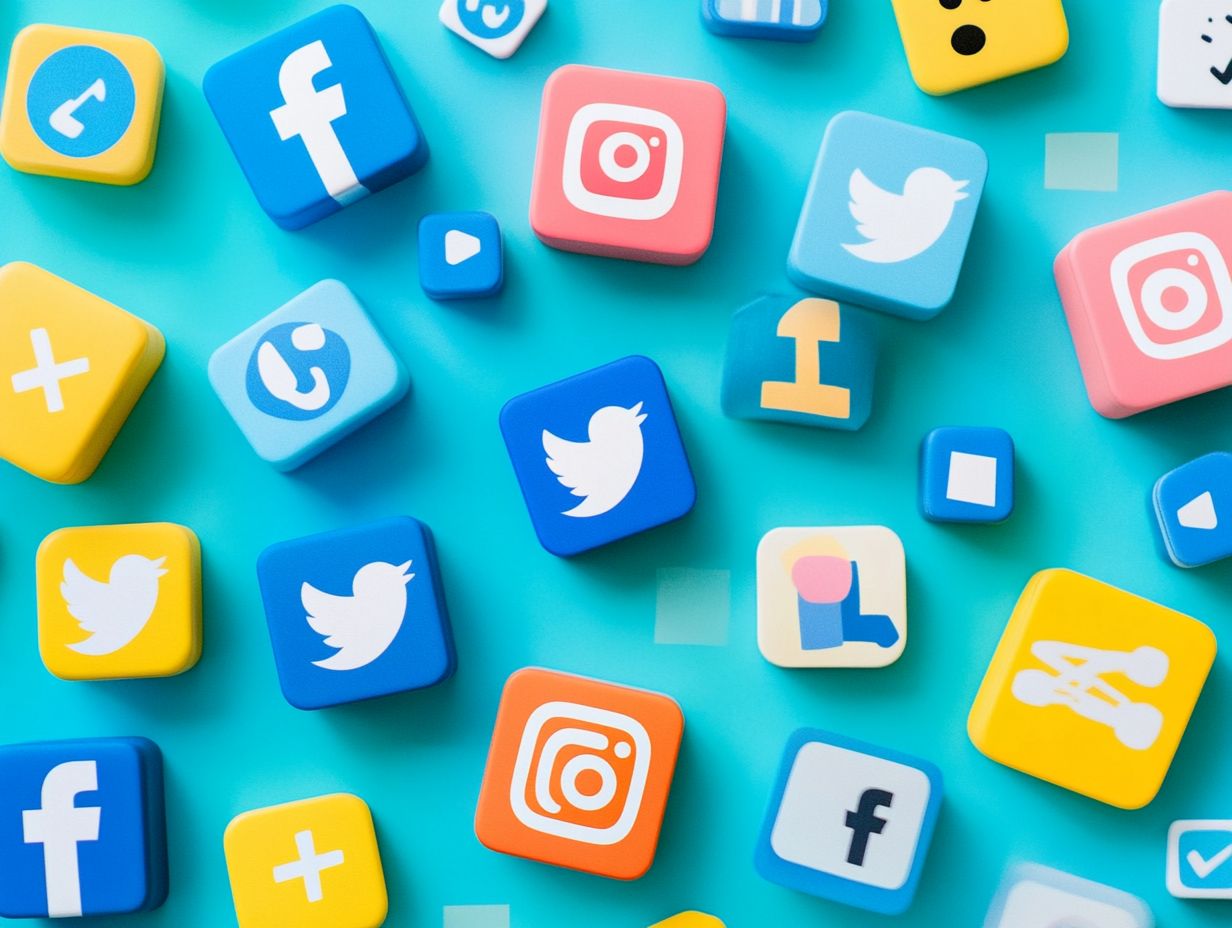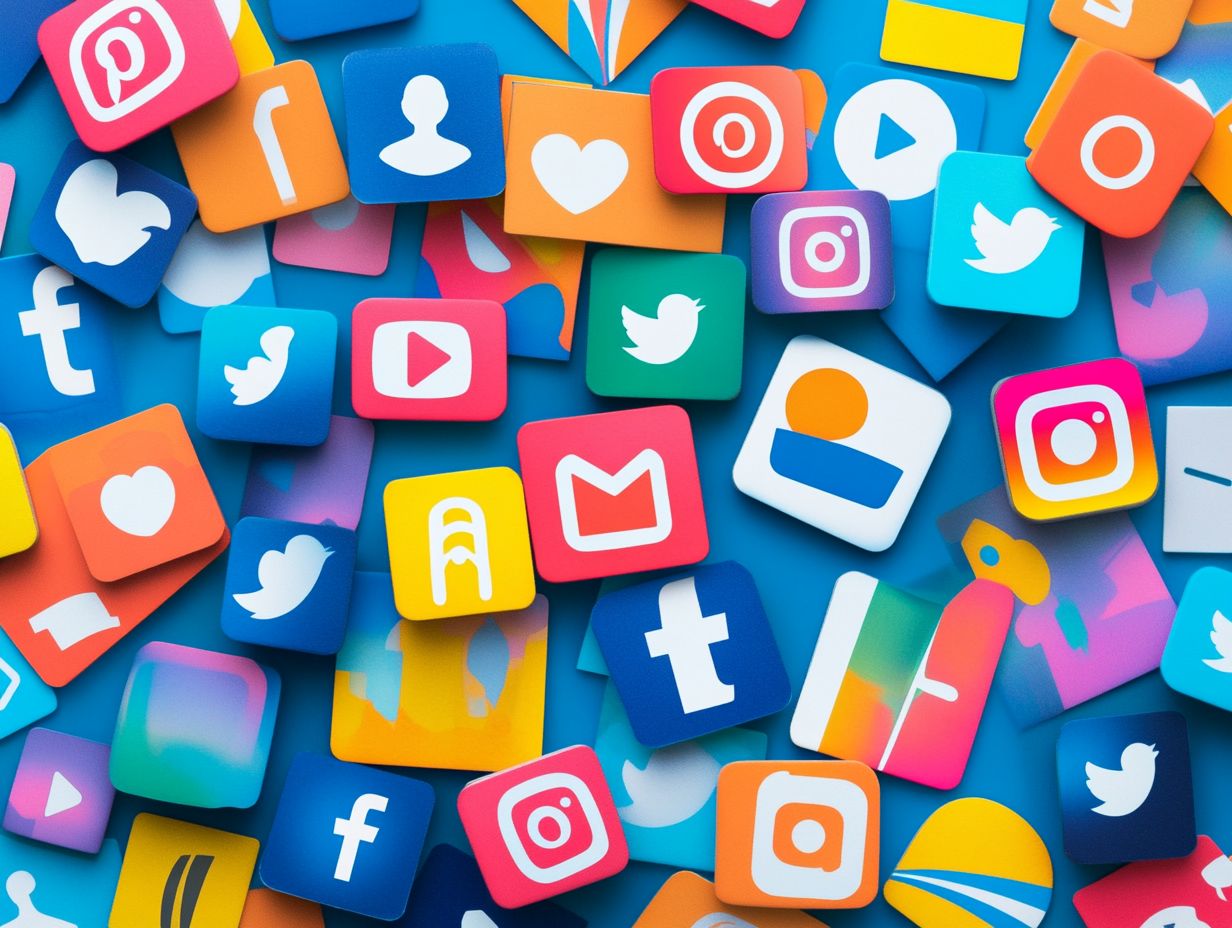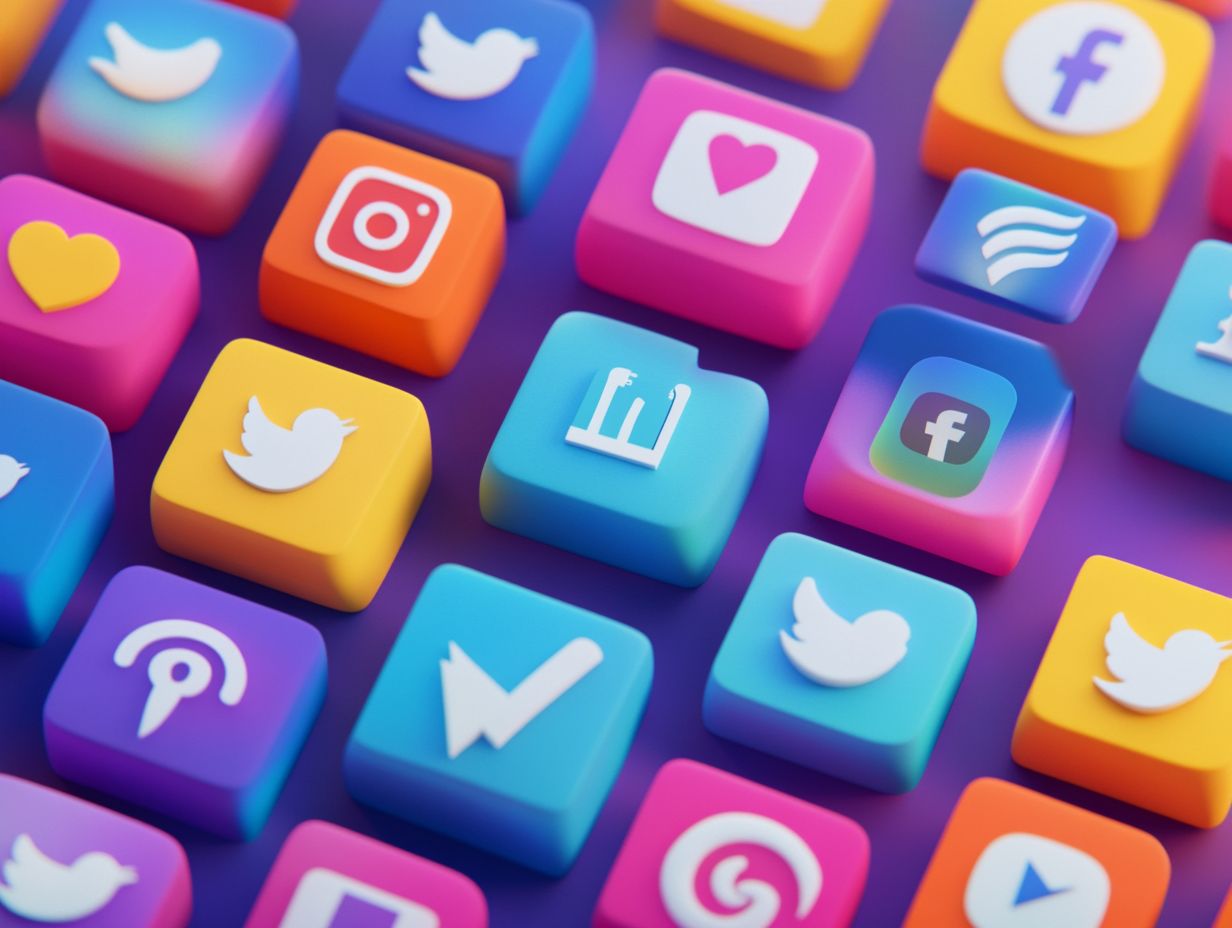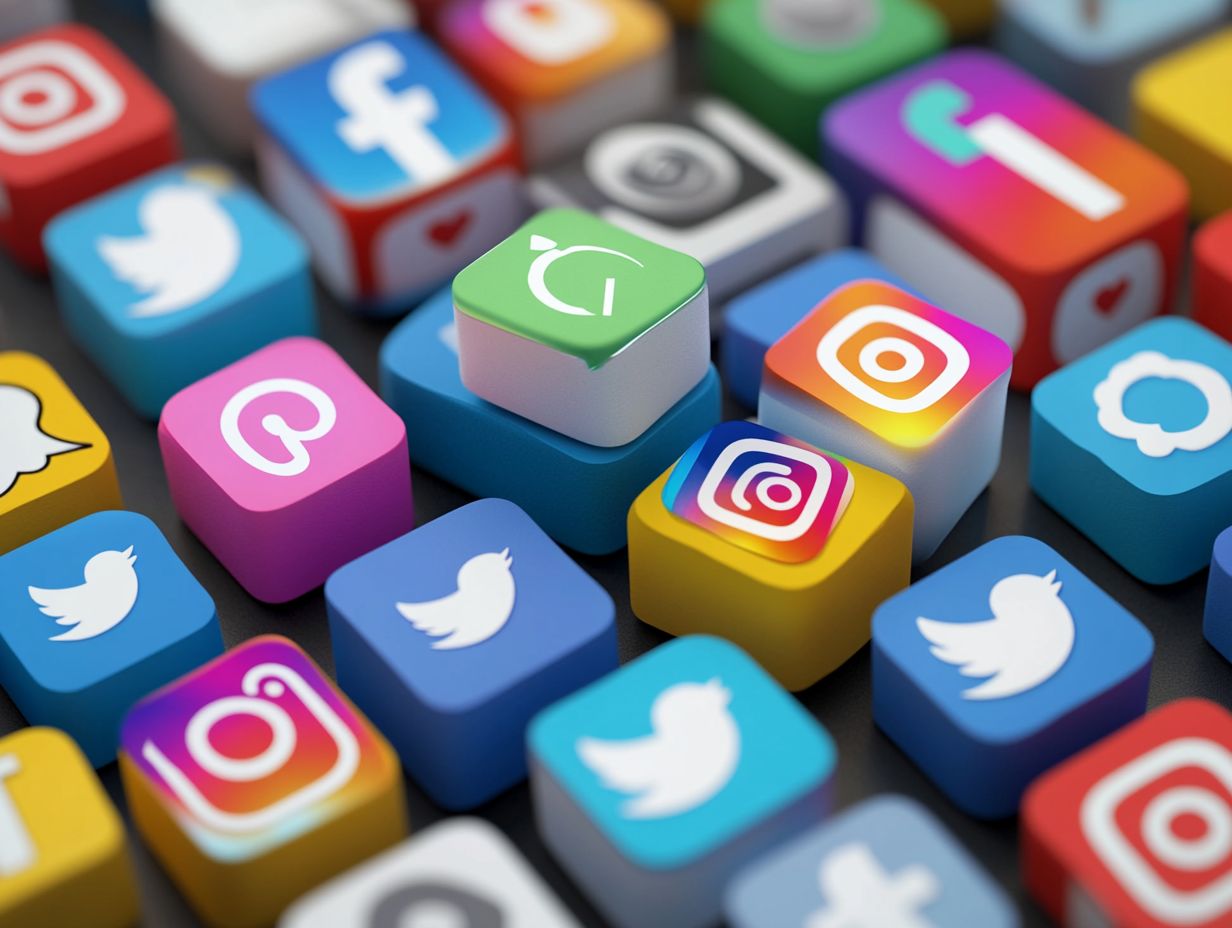5 Real-Life Examples of Social Media Success
Let's Set Up Your Lead Generation Strategy
Fill out the form below, and our team will get in touch with you to create a tailored solution for your business.
In today s fast-paced digital landscape, social media goes beyond just connecting people; it s an essential marketing tool for brands eager to engage their audiences in innovative and impactful ways through effective social media campaigns.
This article delves into five remarkable campaign examples of social media success:
- Starbucks savvy influencer collaborations, including their popular Starbucks Unicorn Frappuccino, showcase the power of creative marketing.
- Wendy s clever Twitter repartee.
- Airbnb s compelling content created by fans.
- Dove s empowering body-positive messaging.
- Oreo s unforgettable Super Bowl tweet.
Discover how these strategies can transform your business, grasp the key elements of a winning social media campaign, and learn to sidestep potential pitfalls along the way.
Whether you re a small business owner or a marketing professional, you ll find valuable insights here to elevate your social media prowess.
Contents
- Key Takeaways:
- 1. Starbucks’ Creative Use of Instagram Influencers
- 2. Wendy’s Savvy and Snarky Twitter Presence
- 3. Airbnb’s User-Generated Content Strategy
- Let's Set Up Your Lead Generation Strategy
- 4. Dove’s Body Positive Campaign on Facebook
- 5. Oreo’s Viral Super Bowl Tweet
- How Can These Examples Be Applied to Other Businesses?
- Let's Set Up Your Lead Generation Strategy
- Let's Set Up Your Lead Generation Strategy
- Frequently Asked Questions
- Let's Set Up Your Lead Generation Strategy
- Let's Set Up Your Lead Generation Strategy
Key Takeaways:

- Utilizing influencer marketing on Instagram can greatly increase brand awareness and engagement.
- A witty and relatable tone on Twitter can help a brand stand out and create a strong online presence.
- Encouraging content created by fans can enhance brand authenticity and build a sense of community for a business.
1. Starbucks’ Creative Use of Instagram Influencers
Starbucks uses Instagram influencers to boost its brand. They combine eye-catching stories with campaigns that connect deeply with customers on an emotional level. By curating captivating content featuring their iconic products like the viral Unicorn Frappuccino they engage loyal customers and attract new ones.
When collaborating with lifestyle influencers who genuinely connect with their audience, Starbucks cultivates a sense of community. For example, posts of influencers savoring seasonal beverages create relatable narratives, reminiscent of campaigns like Nike’s Dream Crazier. This showcases the product in an authentic environment and inspires followers to share their own experiences, solidifying brand loyalty.
Successful campaigns, such as the #RedCupContest during the holiday season, have transformed customer engagement into a vibrant celebration of creativity and community. This initiative highlights diverse content created by fans, deepening the emotional connection consumers feel with the brand.
2. Wendy’s Savvy and Snarky Twitter Presence
Wendy’s has skillfully carved out a distinct space in social media marketing, particularly on Twitter, where its savvy and snarky persona captivates consumers through clever banter that resonates deeply with its audience.
This approach entertains and builds a connection that feels authentic and relatable. You feel as though you re part of an exclusive inside joke. Take, for example, the viral exchange with a competitor involving playful jabs. This showcased Wendy’s remarkable ability to leverage humor, resulting in significant engagement.
When they tweeted, “Our beef is way too fresh to ever be frozen,” it not only grabbed attention but also reinforced their identity as a brand that prioritizes quality. Such interactions elicit laughter and foster a loyal community eager to champion and share their culinary message.
3. Airbnb’s User-Generated Content Strategy
Airbnb s innovative user-generated content strategy taps into the power of its community, crafting real stories that resonate with you as a potential traveler. This approach heightens your engagement and builds trust in the brand.
With features like guest reviews and travel stories, you re invited to share your unique experiences about your stays. This fosters transparency and a sense of belonging among community members, further enhanced through user-generated content.
Take, for instance, the successful Airbnb Open initiative, which invites you to share your stories through visuals and testimonials, weaving a rich tapestry of diverse experiences, much like Spotify Wrapped does for its users.
Social media campaigns like #AirbnbMoment encourage you to post real-time updates of your travels. These posts showcase genuine interactions and inspire others to explore new destinations with confidence. This strengthens the bond between you and your hosts, enhancing the overall travel experience.
Let's Set Up Your Lead Generation Strategy
Fill out the form below, and our team will get in touch with you to create a tailored solution for your business.
4. Dove’s Body Positive Campaign on Facebook

Dove’s campaign on Facebook highlights the brand’s commitment to confidence and real beauty. It connects deeply through emotional storytelling and strong brand values.
By tapping into the collective power of personal narratives, this initiative creates a sense of belonging among individuals who share their journeys. It invites open discussions about the often-taboo topics of body image and self-acceptance.
The visuals used are not just aesthetically pleasing; they evoke genuine emotions and authentic moments that challenge conventional beauty standards. This approach jumps right into the heart of social conversations about the need for diverse representations in media, reflecting a growing awareness of the psychological toll societal pressures can have on self-worth.
Such a thoughtful strategy emphasizes the urgency for change, paving the way for a more inclusive dialogue around beauty.
5. Oreo’s Viral Super Bowl Tweet
Oreo’s viral tweet during the Super Bowl perfectly illustrates how to master social media marketing by being agile and responsive. It shows that a timely and clever response can lead to massive consumer engagement and enhanced brand visibility, much like Peloton s quick adaptations to market trends.
The tweet cleverly referenced the unexpected blackout that paused the game, allowing Oreo to seize the moment when attention shifted away from the event. This strategic move not only amplified their reach but also ignited discussions among fans, leading to numerous retweets across various platforms.
This moment became a classic example of effective marketing. It shows how real-time engagement can build lasting brand loyalty, akin to how TikTok has revolutionized content sharing. In today’s fast-paced digital landscape, such instantaneous interactions can significantly elevate a brand’s presence, proving that being quick on your feet can transform a fleeting moment into lasting brand loyalty.
How Can These Examples Be Applied to Other Businesses?
The innovative strategies used by companies like Starbucks, Wendy’s, and Dove offer compelling campaign examples that you can adapt to elevate your social media marketing efforts. These approaches build strong connections with consumers while resonating with your brand values. Addressing environmental issues can also enhance your reputation.
One effective tactic is to work with influencers. Collaborating with individuals who genuinely embody your values allows you to reach a broader audience authentically. Choose influencers whose aesthetics and messaging align perfectly with your own to maximize impact and ensure that your promotions are effective.
Embracing user-generated content is another powerful method. It showcases real customer experiences, which builds trust and fosters a sense of community. Understanding your target audience is crucial. When you can connect authentically with their interests and values, replicating these successful strategies becomes not just achievable but also effective, driving engagement and loyalty for the long haul.
What Are the Key Elements of a Successful Social Media Campaign?
Key elements of a successful social media campaign include a clear understanding of target audiences and crafting emotional impact through storytelling. Ensure alignment with brand values and environmental issues, as these factors significantly contribute to enhanced consumer engagement.
In today s fast-paced digital landscape, you are challenged to create messages that resonate on a personal level while conveying a strong emotional impact. Consider campaigns like Share a Coke, which brilliantly tapped into personal connections by featuring names on their products, making consumers feel special and included.
The power of storytelling is equally paramount. Look at Nike s Just Do It campaign; it inspires action through real-life narratives that motivate and connect with individuals.
Align your campaign goals with brand values to build authenticity. This approach fosters trust and loyalty among your audience, as demonstrated by successful projects like Show Us by Dove. Don’t overlook the importance of metrics like engagement rates, click-through rates, and conversion statistics to measure campaign effectiveness. These metrics are essential for refining your strategies and achieving even better results in future initiatives.
Let's Set Up Your Lead Generation Strategy
Fill out the form below, and our team will get in touch with you to create a tailored solution for your business.
How Can a Business Determine Which Platform Is Best for Them?

Determining the best social media platform for your business requires a keen understanding of your target audience’s preferences, the nature of the content you plan to share, and the overarching goals of your social media marketing strategy.
By analyzing demographics like age, location, and interests, you can pinpoint where your audience spends the most time online. For instance, if you’re targeting younger users, platforms like Instagram and TikTok are ideal for visually-driven content, perfect for brands that thrive on aesthetics like fashion or food.
If your focus is on B2B services, LinkedIn provides a more professional environment, allowing you to cultivate valuable relationships and share industry insights.
The level of engagement on various platforms also plays a critical role in your decision-making. If your business thrives on direct interactions, Twitter might be your best bet, as it fosters real-time conversations. Ultimately, aligning your content type with each platform’s strengths will pave the way for a more engaging and successful marketing approach.
Don t miss out on this opportunity! Start your social media campaign using these strategies today and watch your engagement soar!
What Are the Risks of Using Social Media for Marketing?
While social media marketing opens up a world of possibilities, be mindful of the risks that it can bring. These include negative consumer feedback, the chance of brand misalignment, and the difficulty of upholding your brand values under public scrutiny.
These concerns aren t just hypothetical; they are illustrated by case studies where brands have faced backlash due to misunderstood messaging or inadequate responses to customer inquiries. For instance, a well-known clothing retailer found itself in hot water after a poorly timed social media campaign clashed with a significant social justice movement, resulting in a customer boycott.
To navigate these turbulent waters, businesses must establish clear social media guidelines. Engaging in effective crisis management planning and cultivating open communication is also essential.
By tackling these challenges head-on, you can protect your brand s reputation and build a more resilient online presence.
How Can a Business Measure the Success of Their Social Media Efforts?
Measuring the success of your social media efforts involves a blend of numbers like engagement and conversion rates, along with qualitative assessments of consumer sentiment and brand perception.
To track your performance across various platforms, leverage tools such as Google Analytics, Hootsuite, and Sprout Social. Each of these tools presents unique advantages, from tracking audience demographics to analyzing post performance and reach over time.
By compiling this data, you can spot trends and patterns that reveal what truly resonates with your audience. Segmenting the data based on factors like time of day, content type, and platform will provide even clearer insights.
Utilizing these analyses shapes your future campaigns and sharpens your overall strategies, enhancing engagement and boosting conversions.
What Are the Common Mistakes Businesses Make on Social Media?
Common pitfalls on social media include inconsistencies in messaging, neglecting to engage with your audience, and failing to align your campaigns with your brand values. These missteps can significantly hinder consumer engagement and tarnish your brand’s reputation.
Let's Set Up Your Lead Generation Strategy
Fill out the form below, and our team will get in touch with you to create a tailored solution for your business.
Such oversights not only alienate potential customers but can also jeopardize existing relationships. For example, if your posting schedule is irregular, it may leave your followers confused about what to expect. Ignoring their comments or questions can create a sense of neglect that drives them away.
To enhance your effectiveness, establish a consistent posting schedule that resonates with your target audience s preferences. Actively engaging with users by responding to comments and messages is equally essential.
Aligning your social media efforts with your core brand values ensures authenticity, fostering trust and loyalty among consumers.
Frequently Asked Questions

1. Coca-Cola’s Share a Coke campaign, where personalized bottles with people’s names were released, resulted in a 2% increase in sales and over 500,000 posts on social media using the hashtag #shareacoke.
2. The ALS Ice Bucket Challenge, which went viral on social media, resulted in over $115 million in donations and increased awareness of the disease.
3. Airbnb’s use of Instagram to showcase unique and beautiful properties worldwide has led to a significant increase in bookings and revenue.
4. The Old Spice “The Man Your Man Could Smell Like” campaign used humorous and viral videos on social media, resulting in a 107% increase in sales.
5. Nike’s #justdoit campaign encourages people to pursue their dreams and goals. It has been widely successful on social media, with over 3.7 million mentions on Twitter and a 6% increase in sales.
Businesses can reach more people through social media. This leads to increased brand awareness and potential sales.
Social media enables real-time communication with customers. Businesses can promptly address issues and build strong relationships.
It serves as a valuable tool for market research. Companies can gather insights and feedback from customers to enhance products and services.
Advertising on social media is cost-effective, providing promotions at a lower cost than traditional methods.
By engaging actively with customers online, businesses can foster loyalty and improve customer retention.
The fashion and beauty industry thrives on social media. Brands like Sephora and H&M showcase products on Instagram and YouTube to engage customers.
Let's Set Up Your Lead Generation Strategy
Fill out the form below, and our team will get in touch with you to create a tailored solution for your business.
Restaurants and food brands effectively use social media to promote new menu items and engage with diners.
Technology companies, such as Apple and Samsung, create buzz around product launches through engaging social media campaigns.
The travel and tourism industry successfully promotes deals on Facebook and Twitter, attracting customers to hotels and airlines.
Non-profit organizations raise awareness and funds for their causes, leveraging social media platforms effectively.
Small businesses can compete with larger brands by building awareness at a lower cost through social media.
Direct engagement with customers allows small businesses to receive valuable feedback for product and service improvements.
Social media advertising helps small enterprises reach specific groups of people, potentially increasing sales.
These platforms enable small businesses to showcase their unique offerings and stand out from the competition.
Consistent engagement through social media helps small businesses build a loyal customer base and improve retention.
Social media has made communication with customers immediate and direct. Businesses can respond to comments and messages in real-time.
Customer service has become more accessible. Customers can easily reach out to businesses through social media and receive quick responses.
This medium allows for personalized communication, where businesses can address customers by name and tailor responses.
It opens up two-way communication channels, inviting feedback and suggestions from customers to enhance offerings.
Businesses can reach a larger audience and build brand loyalty through consistent and engaging communication.
Let's Set Up Your Lead Generation Strategy
Fill out the form below, and our team will get in touch with you to create a tailored solution for your business.






